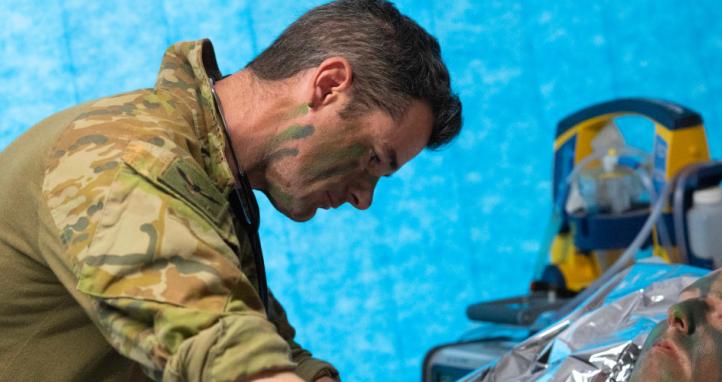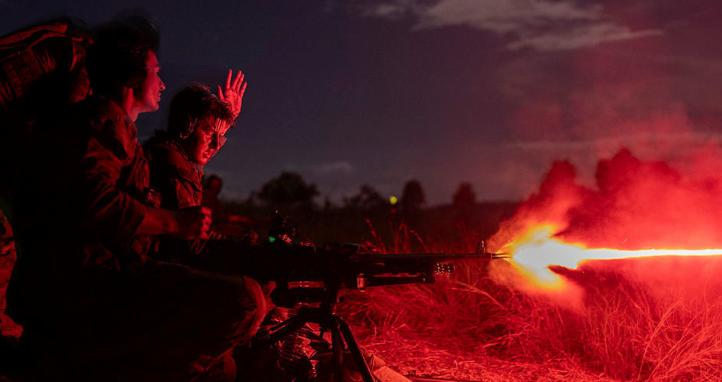ADFA - Creating an officer with an 'added edge'
In 1986, the Australian Defence Force Academy (ADFA) opened for the purpose of training potential junior officers in the Australian Defence Force (ADF). This undertaking was different to any approach previously taken, as it brought together trainees from all three services to live, study and train on a single campus. Today ADFA houses almost 1000 cadets, all attending university classes, conducting PT and marching around in uniform. Each cadet has at least three years to physically and mentally prepare themselves for proper service life. At the other end of the table, the Academy, the University, and their respective cadres of staff have the same three years of opportunity. They have the opportunity to mentor, instruct and motivate these individuals, shaping them into respectable and capable young leaders.
We have the capacity to produce technically minded officers in fields such as engineering and science, as well as creating junior officers with a real appreciation for military strategy, planning and warfighting. This notion of Subject Matter Experts (SMEs) within the officer corps has, within the Army at least, been referred to as the 'GSO+'. The General Service Officer (GSO), with an added edge, is a construct that when used more broadly and deliberately, may allow specialised and unique capabilities to be recognised and utilised.
Biotechnology's place alongside AI and Cyber
With a view of looking forward, the importance and impact of emerging technology is creeping up on all of us. It is now very clear just how prevalent cyberspace and artificial intelligence (AI) will be in the future and I would propose biotechnology should fit into that category too. This is significant in my mind because the threat is clear. We can now revive previously extinct pathogens such as Smallpox and H1N1, thanks to open source DNA sequencing research. Equipment and facilities that were once found only in university labs are now being brought to the home, with the number of maverick ‘bio-hackers’ growing by the day. Bio-terrorism is real, as is human genetic engineering, and the potential impacts are nothing short of frightening. I don’t believe we are providing adequate avenues to craft these potential GSO+ that can properly appreciate the tactical, operation and strategic implications of technical threats such as those presented by biotechnology.
The ADFA tertiary curriculum, as administered by the University of New South Wales (UNSW), is currently absent any complete program relating to biology either within the stream of science or technology. There remains a heavy emphasis on AI and Cybersecurity, as the roles of this technology will no doubt play a pivotal in the future, however, it is through mediums such as biotechnology that the power of AI will be utilised. Biotechnology has the potential to revolutionise training, nutrition and health within Defence, but only if we don’t get left behind. As genetic testing becomes more accessible and cost-effective, we may be able to conduct genetic testing to decipher an individual's characteristics and peculiarities. With that, we can then educate the individual about a program and diet that is best suited, quite literally, to their body: truly unique training. The ‘MedTech’ sector is growing too. Robotic surgery, 3D organ printing and digital healthcare may very well change operational health outcomes for the better with less need to refer patients to international hospitals, faster treatment and better access to a larger amount of information.
But the wider community don’t know this… yet. From my perspective, the current sphere for the creation and use of true GSO+ individuals relies on an extensive amount of pull on behalf of the individual and very little push from Defence. We need to balance this equation and be quicker to recognise talent and determination, and its use.
Embedding biodiversity expertise in Defence
This might be achieved in a number of ways. Continuing the current trend of staffing diversity in terms of background, education and experience, can provide cadets with their own ‘lightbulb moment’. This allows trainees to come to terms with what is truly possible in the organisation. When viewed longitudinally, when a GSO+ returns to ADFA in a staff capacity then this becomes a self-perpetuating developmental cycle. Greater access to conferences, seminars, and lectures (both internal and external to ADFA), would enhance awareness and opportunity. In the long term, the implementation of a biology major, whether genetics or microbiology focused, or a biotechnology degree (BTechBio), would allow trainees to gain technical expertise that is greatly relevant to the ADF. There would also be little requirement to tie a biological program to career (Corps/Specialisation/PQ); it would merely provide an operationally relevant option that is currently absent.
From the perspective of a trainee in their third year at the academy, it is my sincere opinion that this institution should not stagnate in its goal of educating the future leaders of the three services. It would be quite easy to rest on the argument that trainee officers are educated for military life in terms of critical thinking and written expression; however, this falls short of the mark. The implementation of the Joint Military Education and Training (JMET) program is a great example of Defence stepping forward. However, we need to go further and I believe there is room to grow. A greater range of topics available for study at ADFA provides a larger spring-board for the application of foundational knowledge in future study and operational decision-making.
In a more holistic sense, the generalist role of the officer is being underdeveloped. Management is emphasised within the training curriculum, particularly with regard to leadership and ethics. However, more technical considerations with regard to economics, public health and sustainability are repeatedly arising within military-centric problems. These are, in most cases, classically wicked problems. Much of what we do moving forward will be dictated by the climate and many of our actions will affect our economies, particularly around critical resource management. This to some degree has been realised by a revised JMET teaching package introduced at ADFA in 2019, which has multiple ‘Nice to Know’ topics such as climate change and disruptive technology. As a minimum, biotechnology should be added to this list. Preferably, it should take its rightful place alongside AI and Cyber.
The importance of acting now
Defence, through ADFA, has the opportunity to place greater value on individual technical education. Rather than only placing value on the skill of critical thinking, we should encourage the knowledge itself to be applied widely and consistently. It would be well within ADFA’s means to utilise the new JMET program and essentially create a think-tank one thousand members strong. This synergy of technical knowledge, combined with professional military education, could be carried forward past ADFA, generating greater insight and return as individual experience increases. It would be capable of providing the ADF with a cognitive edge courtesy of leaders that will carry forward their curiosity, motivation and insight into the wider defence community. To do this, ADFA must continue to educate the nation's future officers in those emerging technologies that will shape the future character of war. The advances in biotechnology are so profound for the ADF that its omission from the syllabus risk being more than an oversight. If we want leaders who understand the threat biotechnology poses Australia in twenty years time, then we need to give selected GSO+ officers a solid foundation in biotechnology today.









